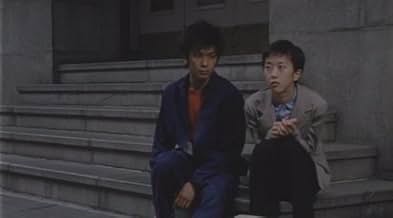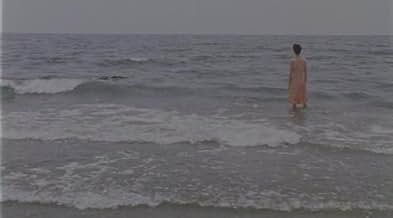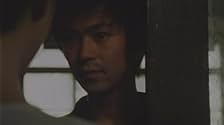Adicionar um enredo no seu idiomaIn future Japan, a dangerous pollen falls upon Tokyo, endangering its populace. Two people volunteer to become tests subject for a drug that could possibly provide a cure.In future Japan, a dangerous pollen falls upon Tokyo, endangering its populace. Two people volunteer to become tests subject for a drug that could possibly provide a cure.In future Japan, a dangerous pollen falls upon Tokyo, endangering its populace. Two people volunteer to become tests subject for a drug that could possibly provide a cure.
- Prêmios
- 1 indicação no total
Avaliações em destaque
It seems that Kurosawa used some sort of the "stamps" during the shot period and totally forgot what he wanted to tell us (OK, OK, not to "us" - just to me). For a contrast you may see another Japanese title - "Enter the void", which itself is a one big "stamp" but is a masterpiece in, at least, its visual part. Because IMDb requires 10+ lines of review, I will add them in a quick way:
Music 3/10, despite the hero is a "music producer". Actors acting 7/10 - especially the heroine. An Idea behind the scenes - non trivial, hard to formulate. Realisation - oops, 3/10. Total 4/10. And the last line: of course, you should see it by yourself to have your own opinion and not to read such a stupid "reviews" like this one.
Music 3/10, despite the hero is a "music producer". Actors acting 7/10 - especially the heroine. An Idea behind the scenes - non trivial, hard to formulate. Realisation - oops, 3/10. Total 4/10. And the last line: of course, you should see it by yourself to have your own opinion and not to read such a stupid "reviews" like this one.
The first film I saw which was directed by Kiyoshi Kurosawa was 'The Cure'. I thought it was one of the best Japanese films I had seen, and I eagerly looked forward to seeing more of his work. I have now watched another eight of his films and even though I didn't really expect to find another 'Cure', I have to say that I have been disappointed with each one of them. Now that I have seen 'Barren Illusion' I know that I am not going to take the trouble to view any more. For me, this film is the worst of them all and appears to be nothing more than a collection of out-takes from a couple of films which have been stitched together, given a title and released on an unsuspecting public. There is nothing of interest here, let alone anything to get excited about.
Echoes of existence within empty halls. The year is 2005, but the printing machine hasn't worked since it turned to the year 2000. Is that when the world came to an end? Our souls perished, yet our physical bodies remained, wandering this desolate reality, doomed to perform daily tasks in autopilot for eternity. The world is dead and allergies have become an epidemic, however, loneliness is an even bigger issue. Our soulless bodies lack any sense of self and purpose, as we drag ourselves aimlessly through life, fading in and out of existence. We have lost all perception of time and space-everything looks the same, and each day is indistinguishable from the previous and the next. As if our lifeless existence were a time loop-"Say, why doesn't anybody try to fix it? Say, why doesn't anybody try to fix it? Say, why doesn't anybody try to fix it?"-A present playing on repeat without ever getting closer to the future. Are we doomed to live in eternal solitude, spiraling down into a bottomless pit of loneliness and despair?
Barren Illusion is one of Kiyoshi Kurosawa's many frightening and obscure explorations of urban decay, disconnection, alienation and human nature. Through ominous and suffocating atmospheres, quietly intense scenes, and bizarre, enigmatic and symbolic puzzles, Kurosawa studies humanity in its most primordial form-our impulses, suppressed feelings, strange behaviors, and how we react to the unknowable and the occult. A melancholic, ghostly exercise on eeriness, uneasiness and psychological horror. This work of 'slow cinema' shares a similar style to that of filmmakers Tsai Ming-liang and Apichatpong Weerasethakul, which is a very visual and minimalist approach to storytelling, with long takes, industrial sounds instead of music, slow camera movements, and zoned-out characters silently walking around and doing random activities, revealing little to no information regarding the plot and themselves. But always with a light touch of surrealism and the sense of an impending doom about to befall the disaffected characters. This film seems to have been inspired especially by Tsai Ming-liang's The Hole, and it feels like the blueprint for Pulse, a similar film of Kurosawa's that would come only 2 years after Barren Illusion.
In Barren Illusion, we are tasked to follow around and observe the boring day-to-day lives of a man named Haru and his girlfriend Michi. Despite the chance of negative side effects, both of them decide to test a new drug that makes them immune to the allergy pandemic. But not because they don't want to wear a mask outside, the reason is likely an internal search for something different, something that breaks the cycle of their monotonous routines. In fact, Haru is so bored and disconnected from the world around him that he disappears sometimes, as if the pressure caused by the emptiness and boredom of his existence is too big a burden for him to bear, and he just... momentarily ceases to exist. Michi dreams of traveling abroad to escape her tedious office job and miserable lifestyle, but she never gets the chance. So, she throws herself off a rooftop after witnessing one of her colleagues do the same. But in the next scene, Michi is fine, as if her death were nothing but a dream. Later on, she's beaten to death by a group of thugs, but again, she appears to be unharmed.
In both cases, Michi dies, but those incidents almost seem to be erased from her existence. This appears to be one of Kiyoshi Kurosawa's dark metaphors, as Michi even tells Haru that she's dead in a certain scene. How can one die, if one was never really alive? The banality and monotony of her life have turned her into a soulless body, as good as dead. Both characters just want to disappear, to die even, so they can escape their realities and attain peace. Barren Illusion is a grim tale of ghosts wandering a barren purgatory, stuck in an agonizing present, hoping for a better future that will never come. The film's imagery is ordinary yet highly thought-provoking and hypnotic, with the retro technological objects and places evoking a strong nostalgia and longing for the late 90s and early 2000s. Barren Illusion is a masterpiece, painting existence as a punishment, a shattered reality as a waking nightmare of dissatisfaction and repetition, an apocalypse of the mundane. Metaphysical, transcendental, psychological horror. The loneliest and bleakest film in the universe.
Barren Illusion is one of Kiyoshi Kurosawa's many frightening and obscure explorations of urban decay, disconnection, alienation and human nature. Through ominous and suffocating atmospheres, quietly intense scenes, and bizarre, enigmatic and symbolic puzzles, Kurosawa studies humanity in its most primordial form-our impulses, suppressed feelings, strange behaviors, and how we react to the unknowable and the occult. A melancholic, ghostly exercise on eeriness, uneasiness and psychological horror. This work of 'slow cinema' shares a similar style to that of filmmakers Tsai Ming-liang and Apichatpong Weerasethakul, which is a very visual and minimalist approach to storytelling, with long takes, industrial sounds instead of music, slow camera movements, and zoned-out characters silently walking around and doing random activities, revealing little to no information regarding the plot and themselves. But always with a light touch of surrealism and the sense of an impending doom about to befall the disaffected characters. This film seems to have been inspired especially by Tsai Ming-liang's The Hole, and it feels like the blueprint for Pulse, a similar film of Kurosawa's that would come only 2 years after Barren Illusion.
In Barren Illusion, we are tasked to follow around and observe the boring day-to-day lives of a man named Haru and his girlfriend Michi. Despite the chance of negative side effects, both of them decide to test a new drug that makes them immune to the allergy pandemic. But not because they don't want to wear a mask outside, the reason is likely an internal search for something different, something that breaks the cycle of their monotonous routines. In fact, Haru is so bored and disconnected from the world around him that he disappears sometimes, as if the pressure caused by the emptiness and boredom of his existence is too big a burden for him to bear, and he just... momentarily ceases to exist. Michi dreams of traveling abroad to escape her tedious office job and miserable lifestyle, but she never gets the chance. So, she throws herself off a rooftop after witnessing one of her colleagues do the same. But in the next scene, Michi is fine, as if her death were nothing but a dream. Later on, she's beaten to death by a group of thugs, but again, she appears to be unharmed.
In both cases, Michi dies, but those incidents almost seem to be erased from her existence. This appears to be one of Kiyoshi Kurosawa's dark metaphors, as Michi even tells Haru that she's dead in a certain scene. How can one die, if one was never really alive? The banality and monotony of her life have turned her into a soulless body, as good as dead. Both characters just want to disappear, to die even, so they can escape their realities and attain peace. Barren Illusion is a grim tale of ghosts wandering a barren purgatory, stuck in an agonizing present, hoping for a better future that will never come. The film's imagery is ordinary yet highly thought-provoking and hypnotic, with the retro technological objects and places evoking a strong nostalgia and longing for the late 90s and early 2000s. Barren Illusion is a masterpiece, painting existence as a punishment, a shattered reality as a waking nightmare of dissatisfaction and repetition, an apocalypse of the mundane. Metaphysical, transcendental, psychological horror. The loneliest and bleakest film in the universe.
Kiyoshi Kurosawa's 1999 masterpiece, Barren Illusion, is a razor-sharp dissection of contemporary Japanese culture which depicts its subject as being so devoid of its own identity that it's almost completely co-opted by mundane Western artifacts. In scene after scene--sometimes subtly, sometimes not so subtly--Kurosawa shows objects with obvious English language markers as critical components of required activity in day-to-day lives. And an all-Japanese music group intermittently shows up pounding on an assortment of Brazilian drums to emphatically demonstrate their (read, the culture's) need to immerse themselves in something completely different from what they are.
To emphasize this more dramatically, Kurosawa has the male lead, a sometime musician, occasionally fade in and out of his surroundings, as though a being who senses intelligently and who, at the same time, is an integral component of his culture, could not (or, perhaps, should not) exist if the culture itself has so little identity. In Woody Allen's Deconstructing Harry a character becomes blurred on screen, but that was a psychological observation linked to the individual's personality. Kurosawa's disappearing act is quite different, much more emphatically connecting the individual to his culture.
There is no real plot in the film, but the intelligence Kurosawa brings to bear is so powerful, a plot is not necessary--nor would it work. He frequently has his characters repeat the same banal action in the same scene (stamping postal documents, kicking a balloon around), indicating much more than a lack of imagination. It is, Kurosawa says, the sterility of a culture that engenders repetitive, non-thinking (i.e., sterile) behavior.
The female lead, a postal worker, is shown involved in activities (in two different scenes) which surely would result in her death--jumping off a building and being severely beaten by a gang of thugs. Yet in each case, she's shown in the immediately following scene alive and whole. How can one die when one does not really live?
This is a brilliant work, very highly recommended. It's a shame that none of Kurosawa's work is available in the U.S. on DVD or video. Rumor has it that Cure, another superb film, will be available in Summer 2002 domestically on DVD.
To emphasize this more dramatically, Kurosawa has the male lead, a sometime musician, occasionally fade in and out of his surroundings, as though a being who senses intelligently and who, at the same time, is an integral component of his culture, could not (or, perhaps, should not) exist if the culture itself has so little identity. In Woody Allen's Deconstructing Harry a character becomes blurred on screen, but that was a psychological observation linked to the individual's personality. Kurosawa's disappearing act is quite different, much more emphatically connecting the individual to his culture.
There is no real plot in the film, but the intelligence Kurosawa brings to bear is so powerful, a plot is not necessary--nor would it work. He frequently has his characters repeat the same banal action in the same scene (stamping postal documents, kicking a balloon around), indicating much more than a lack of imagination. It is, Kurosawa says, the sterility of a culture that engenders repetitive, non-thinking (i.e., sterile) behavior.
The female lead, a postal worker, is shown involved in activities (in two different scenes) which surely would result in her death--jumping off a building and being severely beaten by a gang of thugs. Yet in each case, she's shown in the immediately following scene alive and whole. How can one die when one does not really live?
This is a brilliant work, very highly recommended. It's a shame that none of Kurosawa's work is available in the U.S. on DVD or video. Rumor has it that Cure, another superb film, will be available in Summer 2002 domestically on DVD.
The filmmaker asks if it's unavoidable for young people who are in love to become a couple, to live together and eventually become a family. Oinaru Genei is made of little pieces from the lives of the two main characters, a young man who's a music producer and a girl who works at a postal office. It seems they don't want to move on in their relationship, don't want to grow up.
Director Kiyoshi Kurosawa explores the human condition in the post millennium. With the aid of his students from the film school of Tokyo, he creates an experimental and unusual love story.
Director Kiyoshi Kurosawa explores the human condition in the post millennium. With the aid of his students from the film school of Tokyo, he creates an experimental and unusual love story.
Você sabia?
- ConexõesFeatured in Espionagem na Rede (2002)
Principais escolhas
Faça login para avaliar e ver a lista de recomendações personalizadas
Detalhes
- Tempo de duração1 hora 35 minutos
- Cor
Contribua para esta página
Sugerir uma alteração ou adicionar conteúdo ausente

Principal brecha
By what name was Ôinaru gen'ei (1999) officially released in Canada in English?
Responda

















